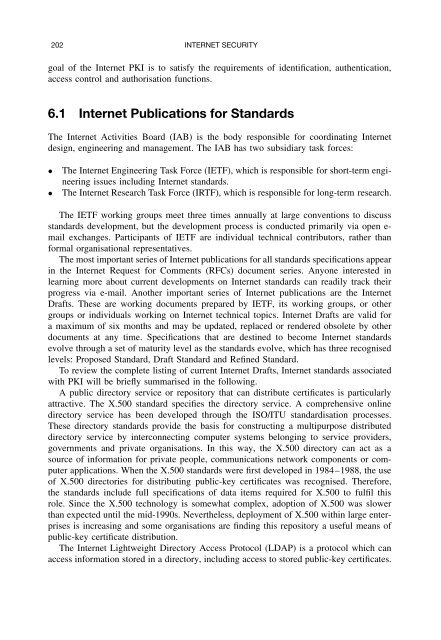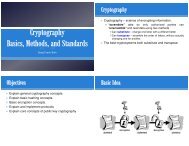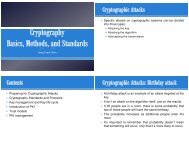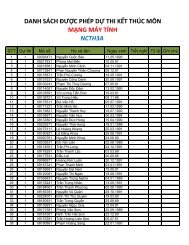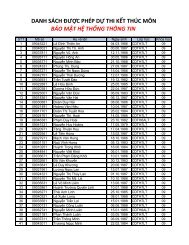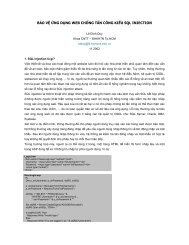- Page 1 and 2:
TEAMFLY
- Page 4:
Internet Security
- Page 7 and 8:
Copyright © 2003 John Wiley & Sons
- Page 9 and 10:
vi CONTENTS 2.3 World Wide Web 47 2
- Page 11 and 12:
viii CONTENTS 5.6 The Elliptic Curv
- Page 13 and 14:
x CONTENTS 10.2.5 De-militarised Zo
- Page 16 and 17:
Preface The Internet is global in s
- Page 18 and 19:
PREFACE xv Policy Approval Authorit
- Page 20 and 21:
PREFACE xvii classified into three
- Page 22 and 23:
1 Internetworking and Layered Model
- Page 24 and 25:
INTERNETWORKING AND LAYERED MODELS
- Page 26 and 27:
INTERNETWORKING AND LAYERED MODELS
- Page 28 and 29:
INTERNETWORKING AND LAYERED MODELS
- Page 30 and 31:
Layer No. 7 6 5 4 3 2 1 OSI Layer A
- Page 32 and 33:
INTERNETWORKING AND LAYERED MODELS
- Page 34 and 35:
INTERNETWORKING AND LAYERED MODELS
- Page 36 and 37:
2 TCP/IP Suite and Internet Stack P
- Page 38 and 39:
TCP/IP SUITE AND INTERNET STACK PRO
- Page 40 and 41:
TCP/IP SUITE AND INTERNET STACK PRO
- Page 42 and 43:
TCP/IP SUITE AND INTERNET STACK PRO
- Page 44 and 45:
TCP/IP SUITE AND INTERNET STACK PRO
- Page 46 and 47:
Class A Class B Class C Class D Cla
- Page 48 and 49:
TCP/IP SUITE AND INTERNET STACK PRO
- Page 50 and 51:
H Host H TCP/IP SUITE AND INTERNET
- Page 52 and 53:
TCP/IP SUITE AND INTERNET STACK PRO
- Page 54 and 55:
TCP/IP SUITE AND INTERNET STACK PRO
- Page 56 and 57:
TCP/IP SUITE AND INTERNET STACK PRO
- Page 58 and 59:
TCP/IP SUITE AND INTERNET STACK PRO
- Page 60 and 61:
TCP/IP SUITE AND INTERNET STACK PRO
- Page 62 and 63:
TCP/IP SUITE AND INTERNET STACK PRO
- Page 64 and 65:
Bits IP header TCP/IP SUITE AND INT
- Page 66 and 67:
TCP/IP SUITE AND INTERNET STACK PRO
- Page 68 and 69:
TCP/IP SUITE AND INTERNET STACK PRO
- Page 70 and 71:
TCP/IP SUITE AND INTERNET STACK PRO
- Page 72 and 73:
TCP/IP SUITE AND INTERNET STACK PRO
- Page 74 and 75:
TCP/IP SUITE AND INTERNET STACK PRO
- Page 76 and 77:
TCP/IP SUITE AND INTERNET STACK PRO
- Page 78 and 79:
3 Symmetric Block Ciphers This chap
- Page 80 and 81:
S-boxes L i−1 S 1 L i SYMMETRIC B
- Page 82 and 83:
K 1 48 bits K 2 48 bits K 16 48 bit
- Page 84 and 85:
Table 3.4 Initial permutation (IP)
- Page 86 and 87:
SYMMETRIC BLOCK CIPHERS 65 Table 3.
- Page 88 and 89:
SYMMETRIC BLOCK CIPHERS 67 This 48-
- Page 90 and 91:
SYMMETRIC BLOCK CIPHERS 69 The 48-b
- Page 92 and 93:
SYMMETRIC BLOCK CIPHERS 71 Thus, th
- Page 94 and 95:
SYMMETRIC BLOCK CIPHERS 73 Round K1
- Page 96 and 97:
SYMMETRIC BLOCK CIPHERS 75 Example
- Page 98 and 99:
64-bit plaintext X 1 X 2 X 3 X 4 Ro
- Page 100 and 101:
SYMMETRIC BLOCK CIPHERS 79 Table 3.
- Page 102 and 103:
SYMMETRIC BLOCK CIPHERS 81 The outp
- Page 104 and 105:
SYMMETRIC BLOCK CIPHERS 83 the corr
- Page 106 and 107:
SYMMETRIC BLOCK CIPHERS 85 Table 3.
- Page 108 and 109:
SYMMETRIC BLOCK CIPHERS 87 of S and
- Page 110 and 111:
Step 3 i = j = 0; A = B = 0; SYMMET
- Page 112 and 113:
3.3.3 Encryption SYMMETRIC BLOCK CI
- Page 114 and 115:
A SYMMETRIC BLOCK CIPHERS 93 A B
- Page 116 and 117:
3.4 RC6 Algorithm SYMMETRIC BLOCK C
- Page 118 and 119:
Mixing in the secret key S A = B =
- Page 120 and 121:
Magic constants: Pw = b7e15163 Qw =
- Page 122 and 123:
A = ((A − S[2i]) >>> u) ⊕ t } D
- Page 124 and 125:
Converting the secret key from byte
- Page 126 and 127:
The final decrypted plaintext is: b
- Page 128 and 129:
Thus, the final decrypted plaintext
- Page 130 and 131:
Multiplication SYMMETRIC BLOCK CIPH
- Page 132 and 133:
where c0 = a0b0 c1 = a1b0 ⊕ a0b1
- Page 134 and 135:
Rcon[2] = [x 1 , {00}, {00}, {00}]
- Page 136 and 137:
Table 3.16 AES key expansion i Temp
- Page 138 and 139:
SYMMETRIC BLOCK CIPHERS 117 ShiftRo
- Page 140 and 141:
Start of round After SubByte SYMMET
- Page 142 and 143:
SYMMETRIC BLOCK CIPHERS 121 Figure
- Page 144 and 145:
4 Hash Function, Message Digest and
- Page 146 and 147:
M = 64 bits C 0 = 28 bits D 0 = 28
- Page 148 and 149:
HASH FUNCTION, MESSAGE DIGEST AND H
- Page 150 and 151:
⊕ : Bit-by-bit XORing of 16-bit s
- Page 152 and 153:
P(Ω 1 )
- Page 154 and 155:
HASH FUNCTION, MESSAGE DIGEST AND H
- Page 156 and 157:
K r : Concatenation IP : Initial pe
- Page 158 and 159:
HASH FUNCTION, MESSAGE DIGEST AND H
- Page 160 and 161:
HASH FUNCTION, MESSAGE DIGEST AND H
- Page 162 and 163:
a b c d HASH FUNCTION, MESSAGE DIGE
- Page 164 and 165:
HASH FUNCTION, MESSAGE DIGEST AND H
- Page 166 and 167:
HASH FUNCTION, MESSAGE DIGEST AND H
- Page 168 and 169:
HASH FUNCTION, MESSAGE DIGEST AND H
- Page 170 and 171:
HASH FUNCTION, MESSAGE DIGEST AND H
- Page 172 and 173: HASH FUNCTION, MESSAGE DIGEST AND H
- Page 174 and 175: H2 = 98badcfe H3 = 10325476 H4 = c3
- Page 176 and 177: HASH FUNCTION, MESSAGE DIGEST AND H
- Page 178 and 179: opad 160 bits (SHA-1) 128 bits (MD5
- Page 180 and 181: HASH FUNCTION, MESSAGE DIGEST AND H
- Page 182 and 183: 5 Asymmetric Public-key Cryptosyste
- Page 184 and 185: User A Generate secret random integ
- Page 186 and 187: ASYMMETRIC PUBLIC-KEY CRYPTOSYSTEMS
- Page 188 and 189: Message m −1 E p q ASYMMETRIC PUB
- Page 190 and 191: ASYMMETRIC PUBLIC-KEY CRYPTOSYSTEMS
- Page 192 and 193: Message m −1 User A A′ private
- Page 194 and 195: ASYMMETRIC PUBLIC-KEY CRYPTOSYSTEMS
- Page 196 and 197: To decipher the message m, first co
- Page 198 and 199: ASYMMETRIC PUBLIC-KEY CRYPTOSYSTEMS
- Page 200 and 201: ASYMMETRIC PUBLIC-KEY CRYPTOSYSTEMS
- Page 202 and 203: a q ≡ 1(modp) a ASYMMETRIC PUBLIC
- Page 204 and 205: ASYMMETRIC PUBLIC-KEY CRYPTOSYSTEMS
- Page 206 and 207: ASYMMETRIC PUBLIC-KEY CRYPTOSYSTEMS
- Page 208 and 209: Receiver: (verifying) Compute: w
- Page 210 and 211: � y2 − y1 x3 = ASYMMETRIC PUBLI
- Page 212 and 213: The square of the integers in Z ∗
- Page 214 and 215: ASYMMETRIC PUBLIC-KEY CRYPTOSYSTEMS
- Page 216 and 217: and y3 = x2 1 + � x1 + y1 = α 12
- Page 218 and 219: ASYMMETRIC PUBLIC-KEY CRYPTOSYSTEMS
- Page 220 and 221: ASYMMETRIC PUBLIC-KEY CRYPTOSYSTEMS
- Page 224 and 225: PUBLIC-KEY INFRASTRUCTURE 203 LDAP
- Page 226 and 227: Session key DES Plaintext m One-way
- Page 228 and 229: PUBLIC-KEY INFRASTRUCTURE 207 Let u
- Page 230 and 231: PUBLIC-KEY INFRASTRUCTURE 209 sent
- Page 232 and 233: Publication of PAA’s public key G
- Page 234 and 235: PUBLIC-KEY INFRASTRUCTURE 213 • P
- Page 236 and 237: Carry out identification and authen
- Page 238 and 239: PUBLIC-KEY INFRASTRUCTURE 217 With
- Page 240 and 241: PUBLIC-KEY INFRASTRUCTURE 219 The s
- Page 242 and 243: 6.4.4 X.500 Distinguished Naming PU
- Page 244 and 245: PUBLIC-KEY INFRASTRUCTURE 223 certi
- Page 246 and 247: PUBLIC-KEY INFRASTRUCTURE 225 • I
- Page 248 and 249: Certificate fields v1 = v2 = v3 (fo
- Page 250 and 251: PUBLIC-KEY INFRASTRUCTURE 229 CRL s
- Page 252 and 253: Subject directory attributes extens
- Page 254 and 255: PUBLIC-KEY INFRASTRUCTURE 233 the s
- Page 256 and 257: PUBLIC-KEY INFRASTRUCTURE 235 • S
- Page 258 and 259: PUBLIC-KEY INFRASTRUCTURE 237 not h
- Page 260 and 261: 6.7.1 Basic Path Validation PUBLIC-
- Page 262: PUBLIC-KEY INFRASTRUCTURE 241 It is
- Page 265 and 266: 244 INTERNET SECURITY The set of se
- Page 267 and 268: 246 INTERNET SECURITY • Key manag
- Page 269 and 270: 248 INTERNET SECURITY 7.1.3 Hashed
- Page 271 and 272: 250 INTERNET SECURITY A B C D IV 67
- Page 273 and 274:
252 INTERNET SECURITY Next header (
- Page 275 and 276:
254 INTERNET SECURITY IPv4 IPv4 IPv
- Page 277 and 278:
256 INTERNET SECURITY within a 32-b
- Page 279 and 280:
258 INTERNET SECURITY addresses, wh
- Page 281 and 282:
260 INTERNET SECURITY If authentica
- Page 283 and 284:
262 INTERNET SECURITY 1 bit Next pa
- Page 285 and 286:
264 INTERNET SECURITY The Situation
- Page 287 and 288:
266 INTERNET SECURITY The Identific
- Page 289 and 290:
268 INTERNET SECURITY The Hash Data
- Page 291 and 292:
270 INTERNET SECURITY The Domain of
- Page 293 and 294:
272 INTERNET SECURITY to the exchan
- Page 295 and 296:
274 INTERNET SECURITY When a Key Ex
- Page 297 and 298:
276 INTERNET SECURITY When a Notifi
- Page 299 and 300:
278 INTERNET SECURITY SSL Handshake
- Page 301 and 302:
280 INTERNET SECURITY SSL record he
- Page 303 and 304:
282 INTERNET SECURITY SSLCompressed
- Page 305 and 306:
284 INTERNET SECURITY • bad-certi
- Page 307 and 308:
286 INTERNET SECURITY - Random: Thi
- Page 309 and 310:
288 INTERNET SECURITY Note that Dis
- Page 311 and 312:
290 INTERNET SECURITY The finished
- Page 313 and 314:
292 INTERNET SECURITY key_block = M
- Page 315 and 316:
294 INTERNET SECURITY opad 160 bits
- Page 317 and 318:
296 INTERNET SECURITY - A B C D IV
- Page 319 and 320:
298 INTERNET SECURITY The PRF is th
- Page 321 and 322:
300 INTERNET SECURITY HMAC SHA1(S2,
- Page 323 and 324:
302 INTERNET SECURITY 8.3.4 Certifi
- Page 326 and 327:
9 Electronic Mail Security: PGP, S/
- Page 328 and 329:
ELECTRONIC MAIL SECURITY: PGP, S/MI
- Page 330 and 331:
ELECTRONIC MAIL SECURITY: PGP, S/MI
- Page 332 and 333:
ELECTRONIC MAIL SECURITY: PGP, S/MI
- Page 334 and 335:
ELECTRONIC MAIL SECURITY: PGP, S/MI
- Page 336 and 337:
ELECTRONIC MAIL SECURITY: PGP, S/MI
- Page 338 and 339:
ELECTRONIC MAIL SECURITY: PGP, S/MI
- Page 340 and 341:
Message packet M T FN H(M) ELECTRON
- Page 342 and 343:
ELECTRONIC MAIL SECURITY: PGP, S/MI
- Page 344 and 345:
ELECTRONIC MAIL SECURITY: PGP, S/MI
- Page 346 and 347:
ELECTRONIC MAIL SECURITY: PGP, S/MI
- Page 348 and 349:
Definition of multipart/encrypted:
- Page 350 and 351:
From: myrhee@tsp.snu.ac.kr To: kiis
- Page 352 and 353:
ELECTRONIC MAIL SECURITY: PGP, S/MI
- Page 354 and 355:
SignatureAlgorithmIdentifier ELECTR
- Page 356 and 357:
ELECTRONIC MAIL SECURITY: PGP, S/MI
- Page 358:
ELECTRONIC MAIL SECURITY: PGP, S/MI
- Page 361 and 362:
340 INTERNET SECURITY conform to a
- Page 363 and 364:
342 INTERNET SECURITY existing on a
- Page 365 and 366:
344 INTERNET SECURITY 10.2.7 VPN So
- Page 367 and 368:
346 INTERNET SECURITY Table 10.1 Te
- Page 369 and 370:
348 INTERNET SECURITY Table 10.3 SM
- Page 371 and 372:
350 INTERNET SECURITY Outside host
- Page 373 and 374:
352 INTERNET SECURITY Internet Pack
- Page 376 and 377:
11 SET for E-commerce Transactions
- Page 378 and 379:
11.2 SET System Participants SET FO
- Page 380 and 381:
SET FOR E-COMMERCE TRANSACTIONS 359
- Page 382 and 383:
SET FOR E-COMMERCE TRANSACTIONS 361
- Page 384 and 385:
SET FOR E-COMMERCE TRANSACTIONS 363
- Page 386 and 387:
Example 11.2 Message Integrity Chec
- Page 388 and 389:
User A 0x135af247c613e815 Message d
- Page 390 and 391:
SET FOR E-COMMERCE TRANSACTIONS 369
- Page 392 and 393:
E KSC (CAC) + E KSC (MD) D CAC MD V
- Page 394 and 395:
SET FOR E-COMMERCE TRANSACTIONS 373
- Page 396 and 397:
SET FOR E-COMMERCE TRANSACTIONS 375
- Page 398:
H MD D CRs K pg M’s cert E K#5 (C
- Page 401 and 402:
380 INTERNET SECURITY DS Dual Signa
- Page 403 and 404:
382 INTERNET SECURITY SA Security A
- Page 405 and 406:
384 INTERNET SECURITY 17. Borman, D
- Page 407 and 408:
386 INTERNET SECURITY 60. Harkins,
- Page 409 and 410:
388 INTERNET SECURITY 106. Metzger,
- Page 411 and 412:
390 INTERNET SECURITY 163. Wijnen,
- Page 413 and 414:
392 INDEX Authentication Header 243
- Page 415 and 416:
394 INDEX delete payload 269, 275,
- Page 417 and 418:
396 INDEX HTML tag 49 ending tag 49
- Page 419 and 420:
398 INDEX Java 48, 49 Joint Photogr
- Page 421 and 422:
400 INDEX packet filter 339, 341, 3
- Page 423 and 424:
402 INDEX secure payment processing
- Page 425 and 426:
404 INDEX transform # field 264, 27


